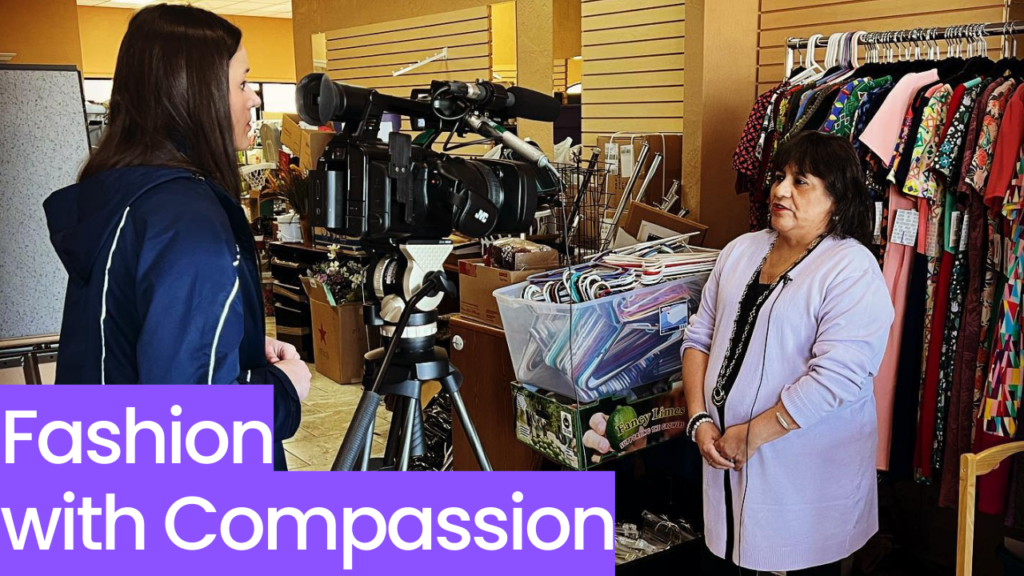Article by: Class XXVI Communication Team

Leadership Tri-Cities Class XXVI is getting ready to break out paint brushes, hammers, and cocktail gowns in preparation for our class project.
You read that right— cocktail gowns.
We are organizing a fundraising event, Fashion with Compassion , to raise funds for Domestic Violence Services of Benton and Franklin Counties (DVS). Some of the money will be used to renovate retail space in Kennewick for a thrift store.
The store will be used as a resource for DVS clients to select clothing and household goods for themselves and their children and will also be open to the public as a second-hand retail store. Funds raised through sales at the store will pay for programs and services without the restrictions that come from grants.
The Project is multi-faceted
The activities include:
- Light construction and remodeling of the retail space
- Branding the thrift store and rebranding DVS (new logo, website)
- Community outreach and advocacy
- Fundraising
Any funds remaining after the construction and branding is complete will be donated to DVS.
Abuse isn’t a private family issue

In 2020, the Kennewick Police Department investigated 618 domestic violence-related offenses. Of those, 388 involved a weapon— in 87% of those cases, the weapon was identified as hands, feet, or fists.
State-wide, about 20% of murders, 59% of kidnappings, 55% of simple assaults, and 31% of aggravated assaults are directly linked to domestic or intimate partner abuse. Law enforcement agencies across Washington investigated 18,002 reported violations of no-contact orders in 2020— 77% of those were related to domestic violence. And this is just what victims are willing or able to report.
This is not a private family issue.
Abuse impacts every facet of our community, from education and law enforcement to social services and employers. Domestic violence is one of the leading indicators of poverty as victims try to reestablish themselves financially after leaving an abuser who may have prevented them from working and denied them access to funds. It’s estimated that as many as 20% of children in the United States are exposed to domestic violence every year. Children who are exposed to violence in the home are more likely to drop out of high school before graduation and are more likely to imitate and transfer learned behaviors to the classroom setting.
From LTC Class XXVI Member, Jenna Kochenauer

Abuse isn’t about anger— it’s about control. My ex-husband never had a problem controlling his anger. He was perfectly capable of commanding his emotions at work, with friends, in social settings. He would pinch me on the back of the arm if I said something he didn’t like in a public setting. The anger was a tool that he used behind closed doors to generate fear so that I would do what he wanted.
He only hit me twice, both times in the first year of our marriage. The first time, I told him if he hit me again that I would leave. When he hit me again, I left. We reconciled a few months later, after he went to counseling and attended anger management classes. He never got better at managing his anger— I got better at predicting his needs in order to prevent angry outbursts. I became timid and submissive, living in constant fear of what might set him off and working constantly to right the wrongs in advance.
He never hit me again after that second time, but he would put me in headlocks and tell me, step by step, what he had learned in hand-to-hand-combat military training about breaking a neck.
“You’d fall to the ground and no one would ever find your body.”
He would pretend to grab a knife from the kitchen counter and press his fist against my chest as if he was stabbing me. He would shove me if I had the audacity to argue with him. He once shoved me to the ground so hard that it caused a miscarriage. I had to perform undesirable sex acts in order to “earn” money for clothes. I was forbidden from talking to my family, from participating in “extra- curricular activities,” and from going to church.
Control is achieved through physical intimidation and assault, sexual abuse, verbal and emotional abuse, psychological abuse, and financial abuse. Your culture, religion, and sexual identity can also be used as tools for controlling you. We’re seeing more and more abuse in same-sex relationships. Abuse leads to isolation, and victims carry a lot of shame and guilt, believing that the abuse is their fault, not the abusers.
It’s during the attempt to separate from the relationship that abusers become the most violent and are more likely to kill their victim.
Having an agency like DVS is critical to saving and improving the lives of domestic abuse victims and their children.
How can I help?
Thank you for continuing to support Leadership Tri-Cities and the work that they do training up new community leaders in the Tri-Cities! It’s our hope to have a tremendous turnout at Fashion for Compassion and we hope to see many LTC Alumni faces in attendance.
Please take a few minutes right now to purchase your tickets for Fashion with Compassion and plan to join us at the event on April 1.
If you can’t attend, please watch for links to participate in the silent auction or consider mailing a personal or corporate donation for the DVS project to:
Leadership Tri-Cities
Fashion with Compassion Fundraiser
PO Box 4660
Pasco, WA 99302-4660
